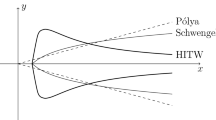Abstract
Let ϕ1(n) = ϕ(n) where ϕ is Euler’s function, let ϕ2(n) = ϕ(ϕ(n)), etc. We prove several theorems about the normal order of ϕk(n) and state some open problems. In particular, we show that the normal order of ϕ k (n)/ϕ k +1(n)is k e γ log log log n where γ is Euler’s constant. We also show that there is some positive constant c such that for all n, but for a set of asymptotic density 0, there is some k with ϕ k (n) divisible by every prime up to (log n)c. With k(n) the first subscript k with ϕ k (n) = 1, we show, conditional on a certain form of the Elliott-Halberstam conjecture, that there is some positive constant α such that k(n) has normal order α log n. Let s(n) = σ(n) − n where σ is the sum of the divisors function, let s 2 (n) = S(S(n)), etc. We prove that S 2(n)/s(n) = s(n)/n + o(1) on a set of asymptotic density 1 and conjecture the same is true for S k+1 (n)/ S k (n) for any fixed k.
Let ϕ1(n) = ϕ(n) where ϕ is Euler’s function, let ϕ2(n) = ϕ(ϕ(n)), etc. We prove several theorems about the normal order of ϕk(n) and state some open problems. In particular, we show that the normal order of ϕ k (n)/ϕ k +1(n)is k e γ log log log n where γ is Euler’s constant. We also show that there is some positive constant c such that for all n, but for a set of asymptotic density 0, there is some k with ϕ k (n) divisible by every prime up to (log n)c. With k(n) the first subscript k with ϕ k (n) = 1, we show, conditional on a certain form of the Elliott-Halberstam conjecture, that there is some positive constant α such that k(n) has normal order α log n. Let s(n) = σ(n) − n where σ is the sum of the divisors function, let s 2 (n) = S(S(n)), etc. We prove that S 2(n)/s(n) = s(n)/n + o(1) on a set of asymptotic density 1 and conjecture the same is true for S k+1 (n)/ S k (n) for any fixed k.
Supported in part by an NSERC grant
Supported in part by an NSF grant
Access this chapter
Tax calculation will be finalised at checkout
Purchases are for personal use only
Preview
Unable to display preview. Download preview PDF.
Similar content being viewed by others
References
E. Bombieri, Le grand crible dans la théorie analytique des nombres, Astérisque 18 (1974), 1–87.
H. Davenport, Multiplicative Number Theory, 2nd edition, Springer Verlag, New York, 1980.
P.D.T.A. Elliott, Probabilistic Number Theory, vols. I, II, Springer Verlag, New York, 1980.
J. Friedlander and A. Granville, Limitations to the equi-distribution of primes I, Ann. Math. 129 (1989), 363–382.
J. Friedlander, A. Granville, A. Hildebrand and H. Maier, Oscillation theorems for primes in arithmetic progressions and for sifting functions, preprint.
P. Erdös, On the density of the abundant numbers, J. London Math. Soc. 9 (1934), 278–282.
P. Erdös, Some remarks on the iterates of the ϕ and σ functions, Colloq. Math. 17 (1967), 195–202.
P. Erdös, On asymptotic properties of aliquot sequences, Math. Comp. 30 (1976), 641–645.
P. Erdös and C. Pomerance, On the normal number of prime factors of ϕ(n), Rocky Mountain Math. J. 15 (1985), 343–352.
R. K. Guy and J. L. Selfridge, What drives an aliquot sequence?, Math. Comp. 29 (1975), 101–107; Corrigendum, Math. Comp. 34 (1980), 319–321.
H. Halberstam and H.-E. Richert, Sieve Methods, Academic Press, London, 1974.
H. W. Lenstra, Jr., Problem 6064, American Math. Monthly 82 (1975), p. 1016; Solution by the proposer, 84 (1977), p. 580.
H. L. Montgomery and R. C. Vaughan, The exceptional set in Gold- bach’s problem, Acta Arith. 27 (1975), 353–370.
S. S. Pillai, On a function connected with ϕ(n), Bull. A.M.S. 35 (1929), 837–841.
I. J. Schoenberg, Über die asymptotische Verteilung reeller Zahlen mod 1, Math. Z. 28 (1928), 171–200.
H. Shapiro, An arithmetic function arising from the ϕ-function, American Math. Monthly 50 (1943), 18–30.
Author information
Authors and Affiliations
Editor information
Editors and Affiliations
Additional information
Dedicated to our friend, colleague and teacher, Paul Bateman
Rights and permissions
Copyright information
© 1990 Bikhäuser Boston
About this chapter
Cite this chapter
Erdös, P., Granvilie, A., Pomerance, C., Spiro, C. (1990). On the Normal Behavior of the Iterates Of some Arithmetic Functions. In: Berndt, B.C., Diamond, H.G., Halberstam, H., Hildebrand, A. (eds) Analytic Number Theory. Progress in Mathematics, vol 85. Birkhäuser Boston. https://doi.org/10.1007/978-1-4612-3464-7_13
Download citation
DOI: https://doi.org/10.1007/978-1-4612-3464-7_13
Publisher Name: Birkhäuser Boston
Print ISBN: 978-0-8176-3481-0
Online ISBN: 978-1-4612-3464-7
eBook Packages: Springer Book Archive



